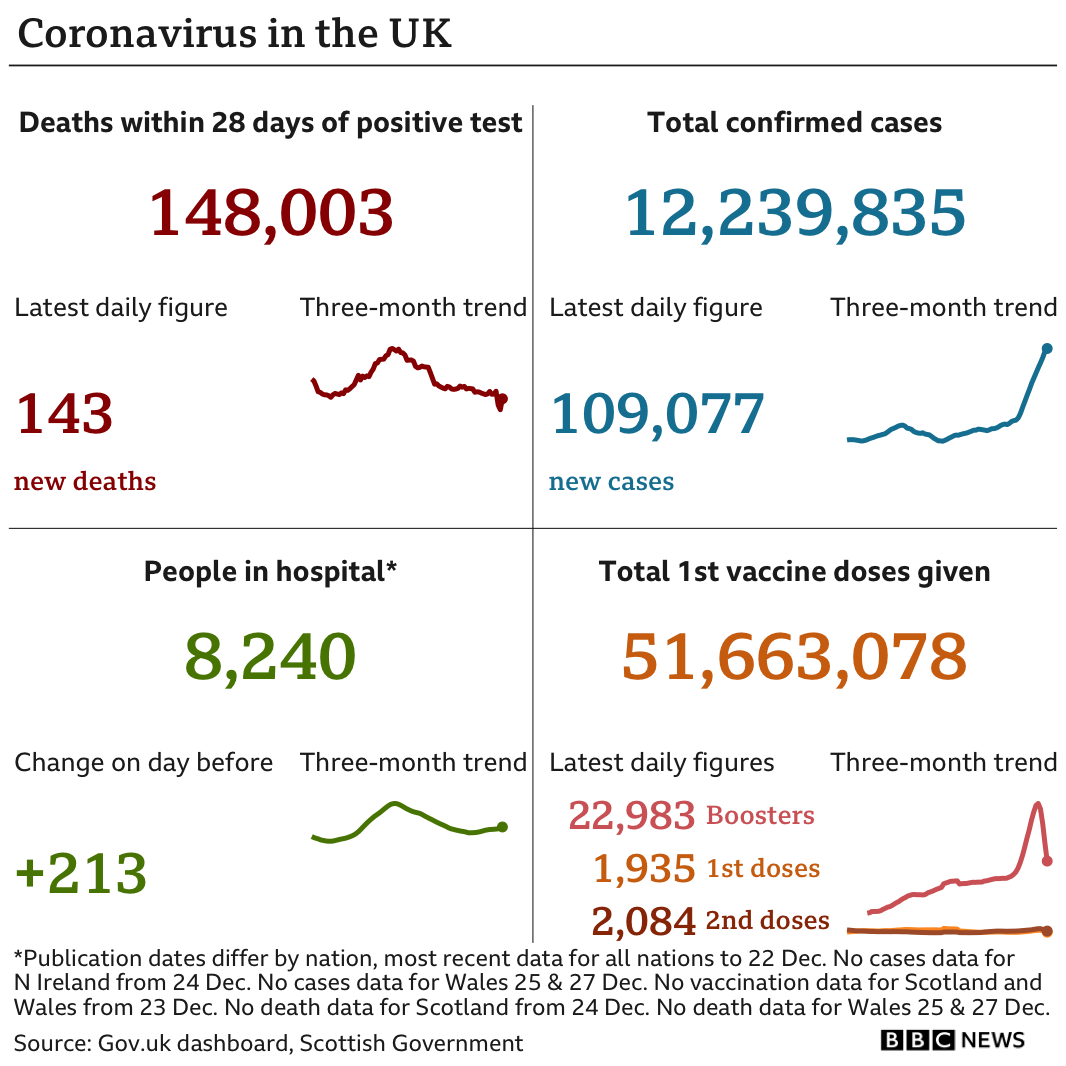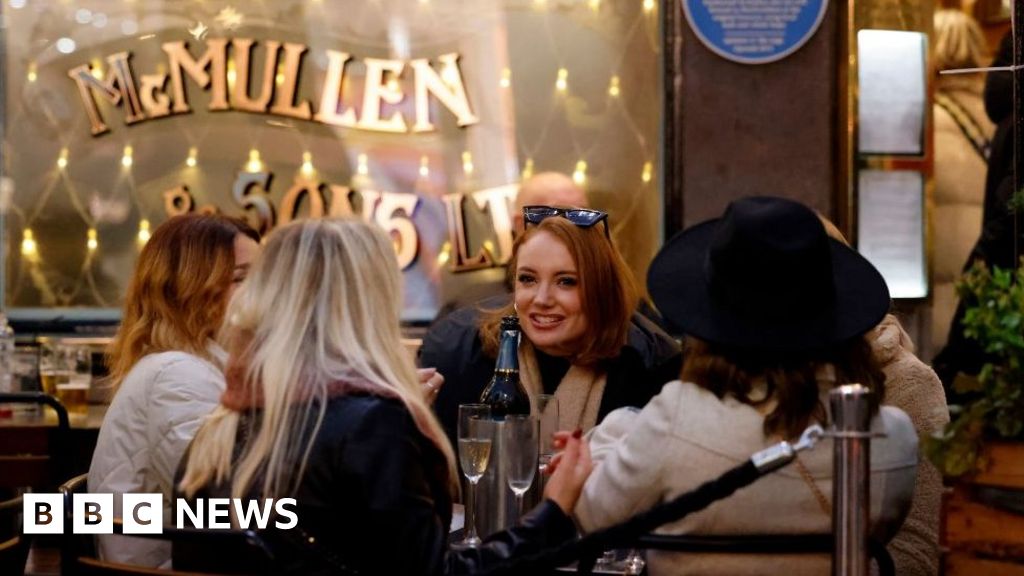
People should enjoy themselves but be cautious when celebrating new year, UK care minister Gillian Keegan has said.
Revellers should take a lateral flow test before going out and celebrate in well-ventilated areas, she advised.
The government is not imposing further Covid restrictions in England, but there are limits on socialising in Scotland, Wales and Northern Ireland.
England has reported a record high of 117,093 cases, while figures from Wales indicate a steep rise before Christmas.
Provisional data in Scotland suggests another 9,360 people have tested positive, down on its record of 11,030 on 26 December. No cases data is available in Northern Ireland due to Christmas holidays.
Meanwhile, England saw another 1,374 Covid hospital admissions on 26 December – the highest number since February.
A total of 9,546 people are in hospital with Covid in England, official figures show. This is the highest since March but well below the peak of 34,000 in January.
Not all the patients in hospital will have been admitted for Covid – latest data suggests about three in 10 have the virus but were admitted to hospital for something else.
Ms Keegan said that while people should try to enjoy themselves on new year, Omicron was “highly infectious” and they needed to exercise caution.
The hospitality sector said the decision not to add further measures was a “lifeline” for pubs, bars and clubs.
This video can not be played
To play this video you need to enable JavaScript in your browser.
Ms Keegan also said 214,000 people had received their booster jab over the Christmas weekend and a total of 32.4 million had now received a third dose.
Earlier, environment Secretary George Eustice said the evidence on Covid cases and admissions did not support more interventions at the moment but the government would keep its decision not to impose further curbs in England under review.
Record levels of demand for Covid PCR tests have left some people waiting for up to five days to receive their results over Christmas – meaning they have had to self-isolate until they receive their negative result.
The UKHSA apologised and said action had been taken to add extra capacity to its laboratory network.
A further 16,133 Omicron cases have been confirmed in England, taking the total to 159,204. Some 49 people with a confirmed case of Omicron have now died, according to UKHSA data.
On Monday, the health secretary said 90% of cases in England were now the Omicron variant, which was first identified in South Africa just one month ago.
Pubs, bars and restaurants have been hard hit in the run-up to Christmas, due to mass cancellations over Omicron fears.
UK Hospitality chief executive Kate Nicholls said the decision not to go beyond Plan B measures in England would give “a real lifeline” to many businesses.
But there are also calls for more support – Adnams brewery boss Andy Wood, told BBC Radio 4’s Today programme more than half of Christmas business had been lost.
Ms Keegan said the government had introduced a £1bn package to support businesses before Christmas.
Schools worry
Concerns have also been raised about the impact on hospitals and schools of staff having to self-isolate.
Prof Paul Hunter, professor in medicine at the University of East Anglia, told BBC Breakfast that in time, people with Covid should be allowed to “go about their normal lives” as they would with a common cold.
“If the self-isolation rules are what’s making the pain associated with Covid, then we need to do that perhaps sooner rather than later,” he said.
He suggested this might be able to happen “once we’re past Easter”, depending on the effects of the disease at that time.
Prof Sir John Bell, regius professor of medicine at Oxford University, told the Today programme the decision not to introduce new curbs before the new year was “probably fine”, with data showing “very low” numbers of vaccinated people in intensive care.
He said the Omicron variant was “not the same disease” we saw last year, adding he thought “the horrific scenes that we saw a year ago” were “now history”.
Staff quarantining was putting additional stress on the health service, Sir John said, and lateral flow tests were “quite a good way” of showing who was infectious – rather than cutting isolation periods as has been done in the US.


Restrictions do not stop Covid, they just buy time by delaying its spread.
Last winter, that time was used to roll out the vaccine programme, which meant when cases started to rise as restrictions were lifted the population was better protected.
Given the extent of the booster rollout – nine in 10 of the most vulnerable have had one – we are about as well protected as we can be.
So the argument for restrictions is more about spreading out the pressure on the NHS and wider economy given that high rates of infection lead to lots of people isolating. But that then needs balancing against the costs and harms of restrictions.
There are finely balanced trade-offs that need to be made.
Ministers in England have clearly decided on a different course to their peers elsewhere in the UK in the belief the levels of serious illness caused in this wave will be manageable.
But even then there is no guarantee the approaches in Scotland, Wales and Northern Ireland will have much of an impact anyway.
Many scientists believe it will take pretty severe restrictions, perhaps a complete ban on indoor mixing, to dent Omicron’s spread.

Chris Hopson, chief executive of NHS Providers, which represents NHS trusts, said some trust executives felt staff absences due to self-isolation were going to be a “bigger problem and challenge” than the number of people being treated for Covid.
He told BBC Breakfast that while there may come a point where Covid was treated like a common cold, that should not be the case for people who work in the NHS, as they dealt with potentially “very, very vulnerable” people.
Geoff Barton, general secretary of the Association of School and College Leaders, said the big issue would be whether there would be enough staff to sustain in-person education when term began in January due to self-isolation.
Not all experts have agreed with the government’s decision not to impose further measures, with Prof Andrew Hayward – epidemiologist and a member of the advisory group Sage – saying ministers seemed to be acting “on the optimistic end of the spectrum”.
Public health professor Andrew Watterson, of the University of Stirling, accused England of being “really out of step” by not introducing further restrictions, saying there was a “real mismatch” between some of the data and policy.

Omicron: What we know
- This variant is very contagious and spreads faster than others
- Vaccines and boosters are still essential and do a great job at protecting against severe disease
- It is milder – if you catch it, the risk of needing hospital treatment is up to 70% lower than with previous variants – but that is largely because many of us have built up immunity from vaccines and past infections rather than changes to the virus

After a two-day halt in publishing data, it was revealed that more than 300,000 new Covid cases had been recorded on Saturday, Sunday and Monday.



What are your plans for new year? Will you be travelling from other parts of the UK to celebrate in England? Are you a pub or club manager in England? Email haveyoursay@bbc.co.uk.
Please include a contact number if you are willing to speak to a BBC journalist. You can also get in touch in the following ways:
- WhatsApp: +44 7756 165803
- Tweet: @BBC_HaveYourSay
- Upload pictures or video
- Please read our terms & conditions and privacy policy
If you are reading this page and can’t see the form you will need to visit the mobile version of the BBC website to submit your question or comment or you can email us at HaveYourSay@bbc.co.uk. Please include your name, age and location with any submission.

- A VERY BRITISH SCANDAL: One of the most notorious and brutal legal cases of the 20th Century
- A STUNNING WINTER WALK: Shepherdess Amanda Owen takes us through the Yorkshire Dales

